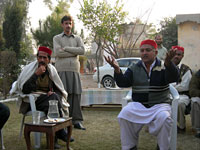2: On the Campaign Trail in Pakistan -
A Fight Between Fundamentalism and Moderation

PESHAWAR, Pakistan—A dozen men sat in a circle in a village outside Peshawar on a recent afternoon. Wearing red caps, they gossiped and drank green tea. The sun fell behind a roof, and several of the men wrapped wool blankets around themselves. All belonged to the Awami National Party, a secular political party based in the North West Frontier Province. The ANP is predicted to win big in the coming elections, mostly at the expense of the Islamist parties who've frightened U.S. policy-makers for the past five years. "This election is a straight fight between those who want war and those who want peace," Asfandyar Wali Khan, leader of the ANP, told me. He drew a line between Islamic militants on the one hand, and his own party on the other. "It is between fundamentalism and moderation."
But the success of the ANP's election campaign signals a shift in the politics of the North West Frontier Province, where the rhetoric of secular nationalism is finding more appeal than that of Islamic fundamentalism. For instance, the ANP proposes changing the name of the province to Pashtunistan ("Land of the Pashtuns") or Pakhtunkhwa ("Pashtun Nation"). (The MMA tried to change the name to Dar-ul-Islam, or "Domain of Islam.") Khan said that all the other provinces of Pakistan shared "frontiers" with Iran, Afghanistan, or India. "But if they—Sindh, Punjab, and Baluchistan—can have their own names, why can't we? This is a matter of our identity."***
To find out how the Islamists felt about their fall from power, I went to Mardan to meet Ata-ur-Rahman. Rahman is a senior leader of Jamaat-i-Islami and a former member of Pakistan's National Assembly. Jamaat-i-Islami is one of the main component parties in the MMA. In December, Jamaat-i-Islami opted to boycott the coming elections in protest against President Pervez Musharraf's regime and what they believe are destined to be rigged elections on Feb. 18. I had met Rahman several times in the past, but when I arrived at his madrasah in late December, he appeared pensive and distracted. He didn't agree with the party's decision to boycott the elections and had argued that doing so would leave the field wide open for the ANP. He lost the argument, and now Jamaat-i-Islami expected him to convince local people of the merits of a boycott.
But what worried him most was the legacy that the Islamists had left behind. "The worst result of our rule was the rise in militancy throughout the region," he said. Rahman is a moderate, with a Ph.D. from the International Islamic University in Kuala Lumpur, Malaysia, as comfortable speaking English or Malay as he is speaking Urdu or Pashto. He is one of the only Islamists I've heard admit that so-called "Talibanization" was a product of the Islamists being in government.



0 Comments:
Post a Comment
<< Home